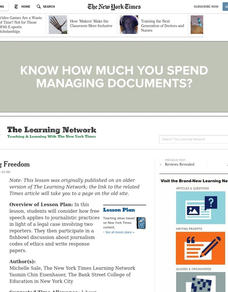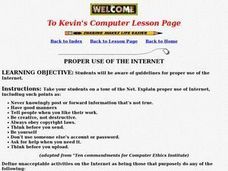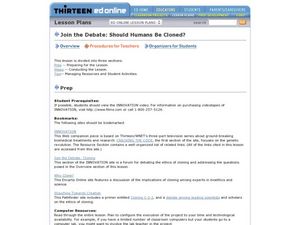College Board
Strategies for Teaching AP Computer Science
Implement strategies from the beginning to the end. A collection of strategies and lessons span from the first day of school to after the exam. Resources cover basic information such as computer ethics and top 10 tips to a lesson on how...
Media Education Lab
The Ethics of Propaganda
What are the short and long-term consequences for consumers and producers of modern media propaganda? Class members ponder this essential question as their unit study of ethics of propaganda concludes. After examining two case studies,...
Curated OER
The Ethics School: Session 5
Middle schoolers discuss the need for a Code of Conduct when they are using any type of technology in their workplace. In groups, they examine the various descriptions of areas to focus on to have a complete professional code of ethics....
Curated OER
Introduction to the Internet
Students conduct a brief overview of the Internet in four main sections: Background of the Internet, E-mail, Web Browsing, and Web Searching. The latter three sections of this unit cover the mechanics as well as the underlying concepts...
Curated OER
Have I Been Hacked?
Students investigate how effective SNEAK strategies are in detecting hackers. In this technology lesson, students explain the ethical issues about hacking. They graph and analyze their experimental results.
Curated OER
Press-ing Freedom
Students consider how free speech applies to journalistic practices in light of a legal case involving two reporters. They participate in a fishbowl discussion about journalism codes of ethics and write response papers.
Curated OER
Tinker Toys
Learners explore various computer items. They describe possible alternative uses for computer technology. Students explore the practice of "reverse engineering." They write an opinion essay on the ethics behind "reverse engineering."
Curated OER
Genetic Engineering
Students discuss the risks and benefits associated with biotechnology. In this biotechnology lesson, students discuss the role of genes in the body and brainstorm ethical issues relating to biotechnology. They read about an ethical issue...
Curated OER
FACS: Exercise Physiologist
Present the exciting career of an exercise physiologist to your teens with a PowerPoint. The slide show explains what this professional does, the education required, the job atmosphere, salary range, and prospects. Finally, viewers will...
Curated OER
Proper Use of the Internet
Young scholars examine guidelines for proper use of the Internet.
Curated OER
What Is Engineering Design
Students investigate the concepts related to the practice of designing and building large scale buildings. They conduct research using the internet and other resources in order to apply mathematics and architectural design principals in...
Curated OER
Should Humans Be Cloned?
Students explore links on the Internet to collect facts about cloning then prepare an essay on their findings. In this research writing lesson students examine how to include their opinions on what they have found in their research.
Curated OER
SAT Sentence Completion Practice Test 03
In this sentence completion worksheet, students choose the answer that best completes each sentence. Students have 10 minutes to complete 12 sentences in this SAT practice worksheet.
Other
Association for Computing Machinery: Acm Code of Ethics and Professional Conduct
The "Code of Ethics" from the American Association for Computing Machinery. Includes responsibility to employers, clients, system users, the profession, and society.















